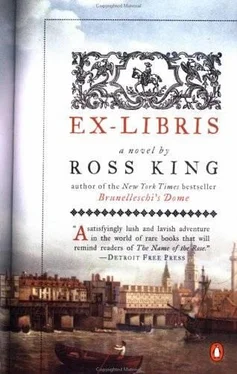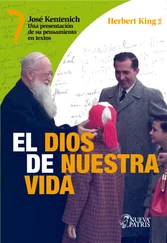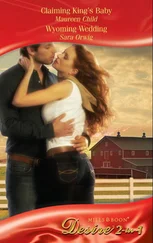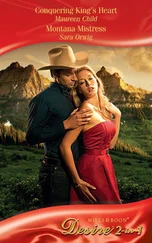NOTICE OF AN AUCTION
to be held at the GOLDEN HORN, Whitefriars,
on the 19 thDay of July, at Nine o'clock in the Morning,
at which time many diverse and uncommon Books
shall be exposed to View and auctioned
in 300 Lots
by Doctor Samuel Pickvance
I stood staring at the handbill as several customers pushed inside and then several more pushed past me into the night. A book auction? It was as if I had stumbled across an edition of Homer or Virgil in the forests of Guiana. I thought I knew everyone in the London book trade, including all of the auctioneers, but I had never heard of anyone named Pickvance, if that was in fact his real name. I wondered what 'diverse and uncommon' books he would be selling and what sort of collectors might turn up to bid for them. But most of all I wondered why he had chosen to auction them in the Golden Horn. It would be easy enough to find out, though, because the nineteenth, the day of the auction, was only two days hence.
Alsatia seemed almost peaceful as I stepped on to the tessellated path, the evening air cool and pleasant compared with the hellish climate of the Golden Horn. The illusion did not last long. A moment later I smelled the Fleet and was bumped roughly aside as four or five men, all wearing falchions or daggers on their hips, swaggered towards the door of the coffee-house. Other figures were moving about in the shadows. Alsatia had come brutishly to life. I shuddered at the prospect of the journey that now awaited me.
But I would make a return trip in two days. I knew this already as I turned round for a last look at the gold antler and the inscription above, neither more than a shadow in the failed light, but each one now a glinting hieroglyph. For there must be a connection, I was suddenly certain, between the parchment I was seeking and the 'strange and uncommon' books of Dr. Pickvance.
***
The journey back to Nonsuch House was, in the event, without incident. I followed the wheel tracks down towards the river and found a waterman dozing at his oars alongside one of the coal wharves. For two shillings he agreed to row me downstream on the tide, which was ebbing once more. When he had fitted the oars into the rowlocks and shoved off with a grunt, I lay back in the sculler and watched the thinning spray of lights ashore. Buildings and spires slipped slowly past; a boat overtook us. Our oars dipped and lifted, dipped and lifted, mud from the shallows catching on the blades and dolloping back into the water. The pitched roof of the Golden Horn shrank, dwindled, disappeared. A few minutes later I could see the moon rising above the chimney-pots on London Bridge. I closed my eyes and felt the sculler slip between the stone piers and plunge, weightless, into five feet of roaring darkness and a sudden rush of spray and air.
Emerging on the other side, legs trembling, I disembarked to find a light burning in my corner of Nonsuch House. Monk had retired to bed, but Margaret was in the kitchen, pickling oysters. She scolded me for missing my supper, boiled brawn, which I ate cold, sitting alone in my study, exhausted. Thirty minutes later I, too, had crawled into bed. I lay still for a long while, listening to the tide gurgling through the piers and trying to steady my breathing. I felt for a moment as if I was still falling between the giant legs of the bridge; as if everything beneath me had, like the sculler, given way to empty air and exhilarated suspension. Because as I drifted asleep I was thinking not only of the handbill pasted to the wall of the Golden Horn but also of the letter, imprinted with a familiar seal, that had been propped on my desk, awaiting my return.
If the journey to the Elbe was arduous, then over the next few days, as the coaches and wagons left Bohemia behind, it grew much worse. Snow began falling from the sullen skies, at first a few aimless and circumspect flakes, then more heavily. The winds gathered in the east and blew across the crescent of the Carpathians, along the Moravian Highlands and into the Giant Mountains, howling among the boulders and snowdrifts through which the caravan fought its way. The few towns it passed through dwindled to villages whose dozen-odd houses clung like swallows' nests to the sides of steep hills. Then the villages shrank to only a few houses and soon disappeared altogether. The road, too, threatened to disappear. In some places it had been made almost impassable by rockslides, in others by snow. To travel in this season, the servants muttered among themselves, was uncivilised. After all, even wars-even Ferdinand, whose Walloons and Irish had stopped in Prague to begin their looting-waited for the spring. Yet each morning, no matter how foul the weather, no matter how steep the roads, no matter how many passengers had fallen ill with fever or how many horses were lamed by wind-galls or split hoofs, the sad journey continued. Soon there were no signs of life in the snowscape except for the wolves that appeared as the roads ascended in dog-legs through the forest. The wolves arrived singly at first, later in packs of ten or twelve, half-hidden among the scarps of granite, following the wagons at a distance. Then they grew bolder, creeping close enough for Emilia to see their yellow eyes and the sharp outlines of their muzzles. Skinny and ill-fed as beggars, they scattered at the muffled report of a harquebus. The sound of the weapon also startled the passengers, for rumours had begun spreading up and down the caravan that the Emperor's mercenaries were in swift pursuit, though it was impossible to imagine how anyone, even the Cossacks, could have sped along roads as treacherous as these.
The first leg of the journey finally reached its end at nightfall on the ninth day. The caravan toiled past a monastery and, after crawling downhill, stopped not at one of the usual inns but before a castle whose lighted arrowslits shone unevenly in the invading darkness. Emilia, huddled in the chariot, her toes frostbitten, fancied she could hear the grumble of a river. Leaning forward, she peered through a crack in the window-curtains and saw a group of men in long coats and wide-brimmed hats hurrying across a courtyard, whose perimeter was rimmed with dozens of coaches of all sizes. The portcullis ground and scraped, then a pair of heavy doors boomed shut behind them. Breslau, someone said. They had reached Silesia.
The exiled court stayed for less than a week in the ancient Piast castle. This was not to be their final destination, merely one more staging-post for the fugitive court. Emilia found herself housed with three other ladies-in-waiting in a chamber that, though it had no windows, was prey to mysterious draughts and dustings of snow. The Queen slept in a chamber somewhere nearby. She had been taken dangerously ill almost as soon as the caravan arrived in Breslau, and so Emilia saw nothing of her. Only the physicians attended her, shuffling in and out of the royal apartments with their faces long and grim. After a day or two, rumours were bruited about the castle that she had died. Then a day later it was her unborn babe who had died-for another rumour, a more reliable one, claimed she was with child. Finally, the pair of them, mother and child, were said to have expired together. Truth became as scarce as firewood and fodder. More snow fell. The Oder froze. Then, on Emilia's fourth day in the castle, Sir Ambrose Plessington paid her a visit.
She was in her chamber at the time, alone, reading a book. When the knock came at her door she didn't rise from the cramped bed because she, like the Queen, was now indisposed. She had felt unwell for the second day in a row. Her monthly pains had arrived a few days earlier, but no monthly flow. Her head ached, as did her teeth, and she was sleeping poorly. Even reading had become a chore. For want of her own books she was reduced to reading ones from the Queen's collection. For the past day she had been reading Sir Walter Raleigh's Discoverie of the large, rich, and beautifull Empire of Guiana , with its blissful descriptions of warm climes and sepulchres filled with treasure. She had been lulled to sleep-her first in more than a day-when the knock on the door startled her awake.
Читать дальше












